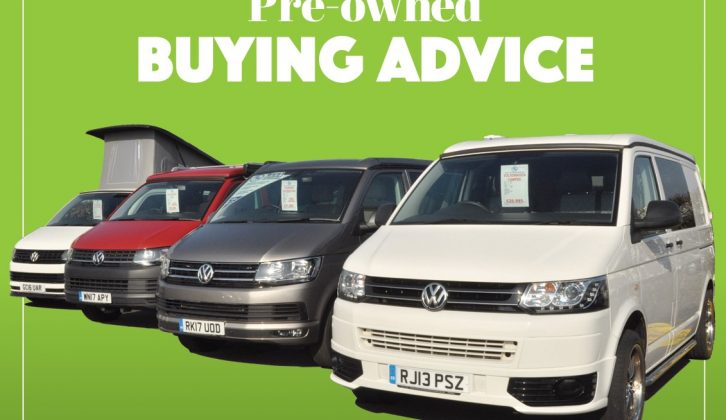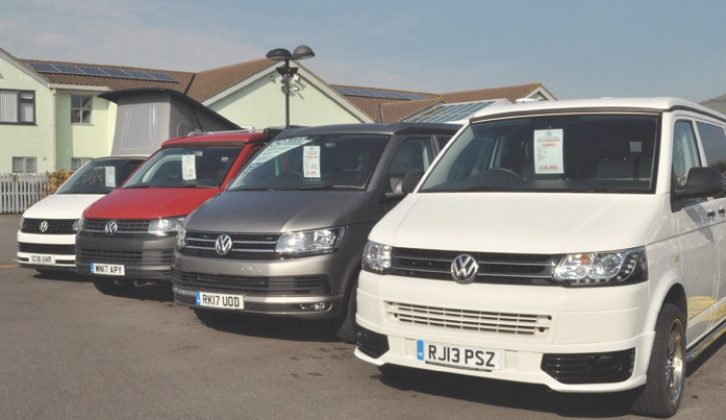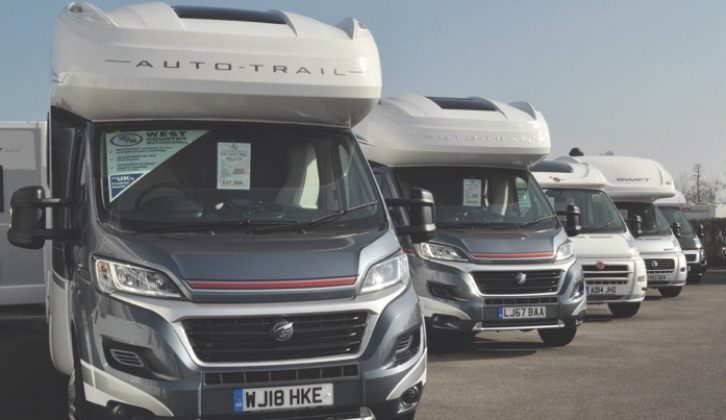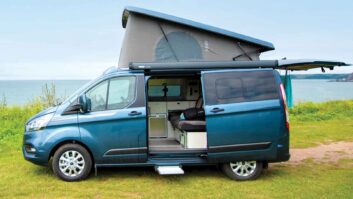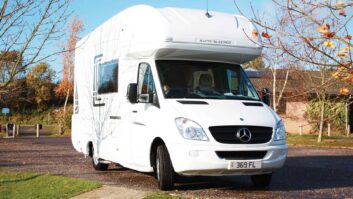There is an ideal scenario when you decide to buy a pre-owned motorhome: make sure that your dealer is a member of the National Caravan Council (NCC) and its Approved Dealer Scheme.
Simple? Not quite. The NCC is the trade body that looks after the interests of the manufacturers and retailers of caravans and motorhomes in the UK. But much of its work, including lobbying government, is aimed at improving leisure vehicle ownership for consumers.
More than 100 specialist caravan and/or motorhome dealerships are members of the NCC’s Approved Dealer Scheme. Most sell new as well as used vehicles. At present, no members sell solely secondhand, but developments are afoot.
It’s estimated that there could be some 350-400 retailers in the UK selling caravans and motorhomes.
The Approved Dealer Scheme was introduced in 2012 – you can find out more at www.thencc.org.uk.
There’s a pretty good chance the dealer you buy from will not be part of the scheme, but don’t worry. The key is to know your rights and understand the processes involved in buying a used motorhome or caravan.
For starters, here are our 10 top tips for the successful purchase of a pre-owned leisure vehicle.
Do your research
This point really cannot be emphasised enough. Make sure that the dealer knows your intended uses for the leisure vehicle you’re looking to buy.
Of course, you should already know the layout, facilities, dimensions and weights that suit you.
For motorhomes, an HPI Check will confirm the vehicle’s authenticity and whether there is any finance (that is, money owed) on it – specialist dealers will be able to provide evidence that they have carried out an HPI Check.
Do confirm for yourselves, too, that all drivers have the right licence for the vehicle you have in mind – if it’s heavy, they will need the C1 category.
Be honest with yourself and dealers
First, you need to be clear in your own mind what you need your vehicle for.
In addition, you need to be open with your dealer about any reservations that you might have.
This might include, for example, if you’re planning on doing anything out of the ordinary, such as overwintering, specific hobbies that might entail carrying specialist kit, whether you want to wild camp or stick to campsites and rally fields, and so on.
It’s also important to be upfront with dealers about your motorhome-driving experience.
Read the dealer’s terms and conditions before you sign them
Reading through the terms and conditions is absolutely vital. Take the time to read them carefully – they can be handed to you or emailed.
If you’re at the dealership, ask for time to sit down over a coffee or similar, just to go through them and make sure that you’re completely comfortable with everything.
Most terms are negotiable. Be prepared to say: “We’re not happy about this. Can we come to an agreement?” Which leads us to…
Don’t be afraid to ask questions
Unsure about anything, at any stage in the process? Just ask.
Be realistic in your expectations of what you’re buying
It’s not like purchasing a car. For a start, there are a lot more things that can go wrong. Obviously, too, you’re buying a product that’s been used. It still has to be fit for purpose.
Do note that buying a motorhome or caravan that’s nearly new can actually be a better purchase than buying brand new – the original owner will have taken the initial depreciation hit, will probably have had any early glitches sorted out and, equally probably, will have had some attractive extras fitted. Actual use might well have been minimal.
Get it in writing
If, for example, you do come to any agreement outside the terms and conditions, make sure you have it all in written format, preferably on your sales invoice or at the bottom of the terms and conditions document that you sign.
Rest assured
This industry is genuinely lovely – and that includes the folk who sell you the vehicle of your dreams.
Sit on it
It’s a good idea to give yourself some last-minute thinking time, before you commit to your purchase. You might even suggest going away from the dealer, to consider things overnight. A good dealer recognises the investment you’re about to make and will give you the breathing space, knowing that in the longer term this will benefit both parties.
Join a club
We’re lucky in the UK – we have two excellent touring organisations, who will help you make the most of your leisure vehicle ownership: The Caravan and Motorhome Club and The Camping and Caravanning Club.
Both offer access to legal helplines as part of their membership packages. Both have technical information departments – not strictly for help with buying, but ideal for checking details.
Get out and use your vehicle as soon as possible
A weekend away locally is sufficient for you to get used to your purchase and pinpoint anything that might not be working as it should. Don’t worry if you have a list of snags – a good dealership will rectify most things simply and quickly.
The Consumer Rights Act 2015
The Consumer Rights Act (CRA) is designed to make consumer law easier to understand, so customers can buy and businesses can sell in confidence, each knowing where they stand.
Coming into force in 2015, the Act consolidated some 12 pieces of consumer-related law (including the Sale of Goods Act and Supply of Goods and Services Act), aiming to reduce it to three – Consumer Protection Regulations, Consumer Contracts Regulations and the CRA. The latter covers supply of goods – including the sale of caravans, motorhomes, accessories and related services.
It also follows processes for when goods fail to perform to the contract, including the following:
- There is a short-term right to reject a product, but that has to be exercised within 30 days, for goods that fail to conform (that is, goods that are seriously defective).
- There are also first-tier remedies. These require a trader/dealer to repair or replace goods deemed to be faulty. If any non-conformity is not resolved after one repair, or one replacement, or if a new non-conformity arises, there are second-tier remedies.
- Second-tier remedies can be a price reduction, for example, if you decide to keep the product despite its faults. Or you can reject and claim a refund, partial or full. A dealer might be able to make a reduction for use.
The 30-day period runs from the later of the transfer of ownership, or possession, or delivery.
Consumers have a right to remedies both within the initial 30 days and after it. If goods do not conform to contract within the first six months, the consumer is entitled to request their repair and/or replacement, because any fault will be presumed to have been in existence at delivery.
You cannot insist on a replacement where it would disproportionate in terms of the costs of providing any repair.
Advice from the NCC
Jo Chubb is the NCC’s head of membership. Here’s her advice about buying:
“Leisure vehicles, by their nature, are very emotional purchases. You have to try to take the emotion out of the buying process.
“I always liken purchase of a leisure vehicle to getting married with a pre-nup.
“It’s an exciting purchase. You’re actually buying into a lifestyle, buying into a dream. And it’s fantastic. However, you have to put your sensible head on, just in case things go wrong further down the line. You’re investing thousands of pounds of your money.”
“Typically, we find that many customers discover things like the CRA after something has gone wrong. Good advice is to have general knowledge of your rights as a consumer before you begin to look for that dream vehicle.
“A good place to start is to visit the websites of bodies such as the Consumers’ Association and Citizens Advice for useful, friendly, simple guides.
“The ‘buyer’s remorse’ scenario inevitably comes into play from someone buying without thinking it all through.
“If there are any niggles you’re not sure about, ask the dealer. Don’t feel that you have to sign on the dotted line on the day. The dealer will be grateful for this further down the line.
“Check with your family, sort your finances and so on, do whatever it takes to eradicate that niggle. Remember, this is a very big investment.
“The Approved Dealer Scheme is relatively new. However, we have strict criteria. For example, anything that a dealer sells (caravan or motorhome) has to be NCC Approved and/or have an equivalent European rating. We’ve still got a way to go and we are looking at expanding the scheme, to make it easier for secondhand dealers especially, but also maintaining our criteria.”
Buying privately
There’s absolutely nothing wrong with private purchase. You just need to know what you’re walking into. Go into it with your eyes wide open. Get it checked out.
Bear in mind, though, that if you are buying privately, the CRA doesn’t apply.
You have two rights that should be there at point of sale with the seller.
First, the seller must have the right to sell the vehicle, for example as the owner or with the permission of the legal owner.
In addition, the goods must be as described. If there are photographs, for example, these must represent the actual vehicle being sold (ideally, they should be of the actual vehicle itself).
Other than these two rights, buying privately, you have very little comeback.
Go POPPI and get an official inspection
POPPI, a Pre-Owned Pre-Purchase Inspection, is another service operated by the NCC.
This is where a qualified specialist will come along and check a pre-owned vehicle. You can use POPPI whether you’re looking to buy privately or from a dealer. Expect to pay around £100.
Again, you can find out more about this service on the NCC website.
Key points
- If anything goes wrong, liability lies with the dealer, not the manufacturer.
- There is no such thing as a non-returnable deposit. Under Consumer Contracts Regulations, if a sale fails to go through, the dealer can keep the deposit, but only as much as it can evidence as an actual cost to it.
- Shows are great places to buy a motorhome or caravan, ideal for taking advantage of good special offers and so on. But make sure to do your homework beforehand. Do not impulse buy at a show!
- Don’t forget the Practical Motorhome Customer Satisfaction Awards – the only ones of their type on the market. These annual awards are based on reader feedback and will direct you towards the best dealers.
- The NCC can only deal with complaints involving an NCC member (however, it can point you in the right direction for further help). In addition, it only deals with complaints in writing. The reason for this is obvious – there needs to be a written record of who said what and when they said it.
- Worst case scenario? Visit your solicitor.
Consumers have a right to remedies both within the initial 30 days and after it
